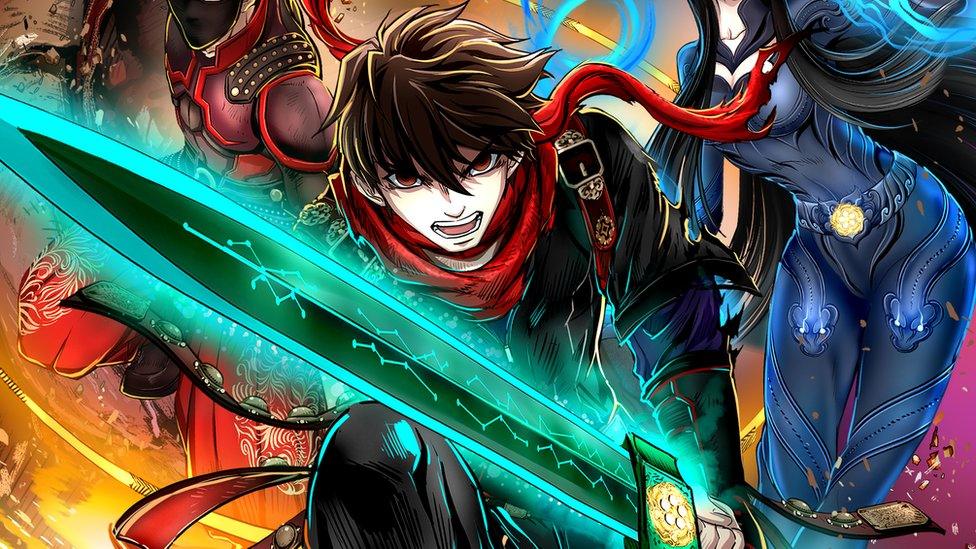Marvel Phase 4: A new era for diversity in Hollywood?
- Published
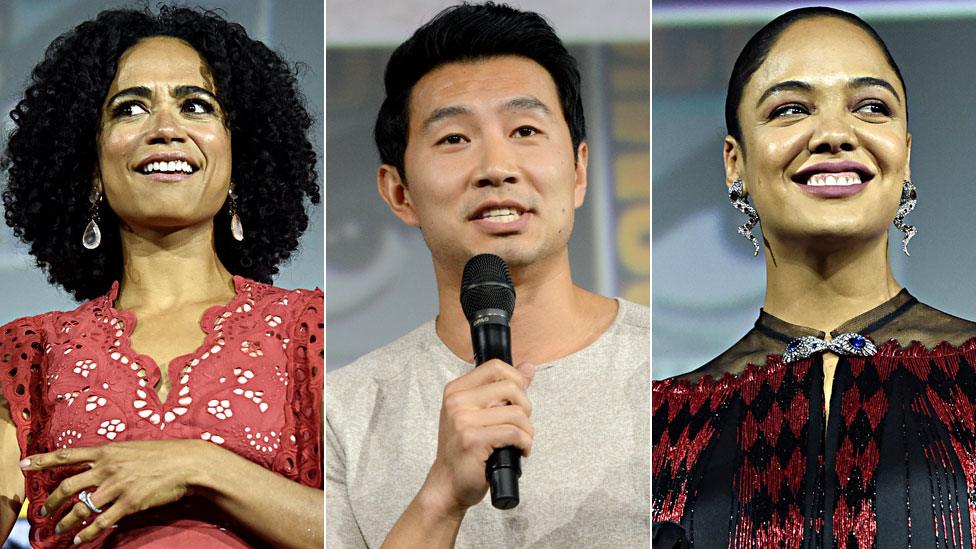
Left-right: Lauren Ridloff (aka Makkari), Simu Liu (Shang-Chi) and Tessa Thompson (Valkyrie)
Comic book fans have been left giddy with anticipation by the bumper crop of superhero offerings unveiled by Marvel Studios at this year's Comic Con.
Details of Marvel's so-called "Phase 4" have also raised hopes about a real step forward for diversity in Hollywood.
The next stage of the Marvel Cinematic Universe will feature its first deaf superhero, its first Asian-American superhero and an openly gay superhero.
It will also see more women than ever taking the directorial reins.
"Marvel are trying to strive for diversity in a way that doesn't feel forced," presenter and Marvel fan Claire Lim, external tells BBC News. "They're just trying to represent what we see on the streets."
Some cynics have accused the studio of only improving representation after 2018's Black Panther became a blockbuster hit, however.
"Does anyone else feel a little icky that in this vast #MCU they didn't care about diversity or representation until phase 3, and then AFTER they made sure it's profitable they announce ALL THE DIVERSITY for #MarvelPhase4?" wrote LJ Thomas, external.
Fellow Twitter user Hippie J wrote:, external "I'm happy we have more diversity in phase 4 but I'm not overly about to praise the mcu and marvel studios be[cause] they waited until it was profitable to do so."
Lim, though, believes there is no ulterior motive. "I think it's genuine, because a lot of millennial and Gen-Z people expect diversity," she says. "They don't want it as an add-on."
'This is huge'
The casting of deaf actress Lauren Ridloff as superhero Makkari in 2020 release Eternals has been particularly applauded on social media.
"This is huge," wrote Twitter user Adam Pottle, external. "Millions of deaf kids will see Lauren as a superhero and feel that they too can act and play superhero[e]s."
"Congratulations, @LaurenRidloff!" wrote Mary Harman, external, who describes herself as a "proudly deaf sci-fi junkie". She added: "Can't wait to see authentic representation on the big screen."
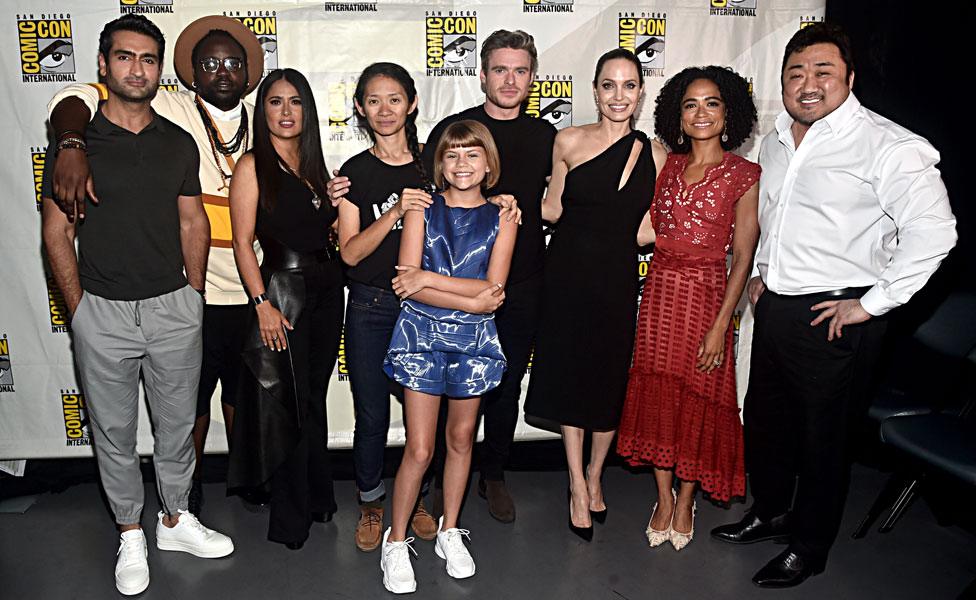
Salma Hayek (third from left) and Richard Madden (fourth from right) also star in Eternals
Other social media users praised Marvel for casting the black actress as a character who has always been depicted as a white male in its comic books.
On Saturday, Ridloff herself expressed delight at the prospect of co-starring with Angelina Jolie, Richard Madden and others under Chloe Zhao's direction.
"I am so honoured to be here," she signed as she stood on stage alongside her co-stars, who also include Pakistani-American actor Kumail Nanjiani and South Korean actor Dong-seok Ma, aka Don Lee.
Mexican actress Salma Hayek also voiced pride at being "a part of a movie that is going to allow people who never felt represented in superheroes".
According to Claire Lim, Ridloff's casting represents "a bit of a sea change".
"We talk about LGBTQ+ people, we talk about people of different races and genders, but I think we forget that diversity means people of all different abilities as well," she says.
'So much at stake'
Meanwhile, Hawaiian director Destin Daniel Cretton revealed that Canadian star Simu Liu will play the MCU's first Asian-American movie superhero, in Shang-Chi and The Legend of the Ten Rings.
"It's amazing to see Kevin [Feige] and his team create an MCU that reflects all the beautiful colours that we see in this room," he said.
The actor tweeted afterwards, external: "There is so much at stake here. We are fighting for our identity, for our right to be seen, to BELONG."
Many Twitter users were no less delighted that Shang-Chi - a kung fu master who made his first comic book appearance in 1973 - was headed for the screen. "I know comics are for everyone but this film is clearly specifically for me," wrote Amanda Yeo, external.
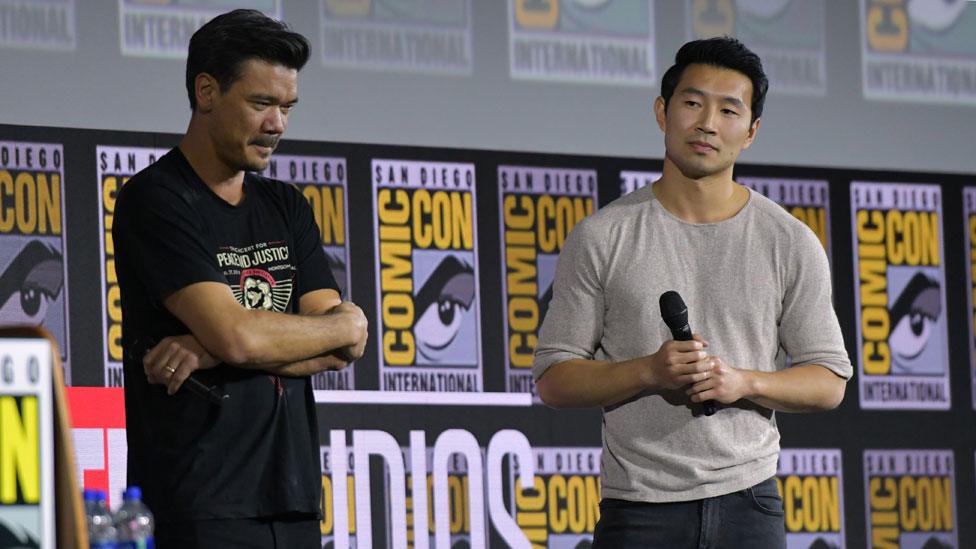
Destin Daniel Cretton (left) with Simu Liu at Comic Con in San Diego
Others were quick to remind Marvel of some of its previous mis-steps over the representation of its ostensibly Chinese characters. The Shang-Chi movie will feature Hong Kong actor Tony Leung as The Mandarin, a villainous character who previously featured in 2013's Iron Man 3.
On that occasion, however, 'The Mandarin' was revealed to be an imposter named Trevor Slattery who was merely pretending to be the fearsome terrorist. "Is Disney finally admitting that Iron Man 3's Mandarin twist was a terrible idea?" asked one Twitter user, external.
'A big deal'
In 2017, the Power Rangers reboot made headlines for making one of its heroes, yellow ranger Trini, openly gay. Last year, meanwhile, shooting began on a Batwoman TV series that will see Ruby Rose play the comic book world's first openly lesbian superhero.
On Saturday, Marvel rather belatedly got in on the act by confirming the sexual orientation of Valkyrie, the female superhero introduced in 2017's Thor: Ragnarok.
In the next Thor film, actress Tessa Thompson revealed, Valkyrie's "first order of business" would be "to find her queen". Marvel supremo Feige later confirmed that meant Valkyrie would be the first openly LGBTQ superhero in a Marvel film.
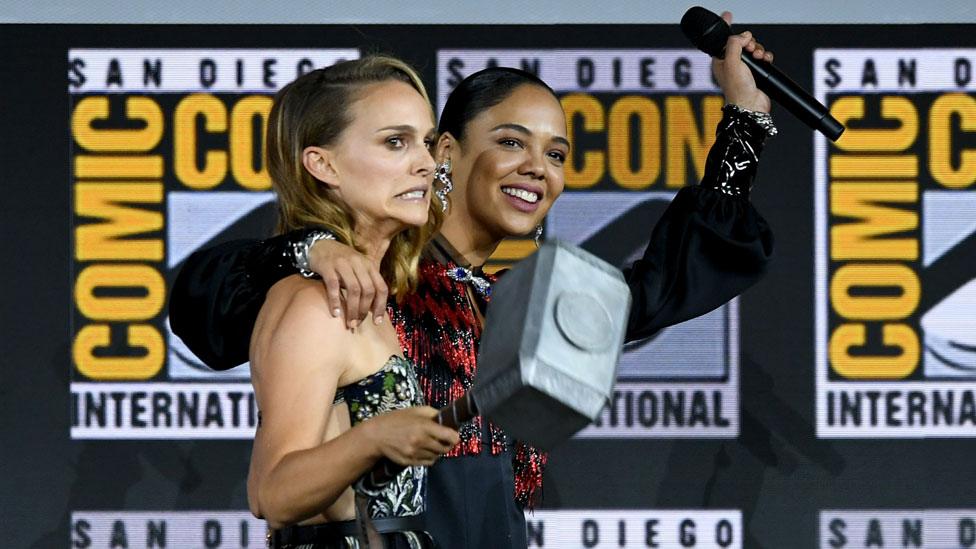
Thompson will appear with Natalie Portman (left) in Thor: Love and Thunder
Writing on the LGBTQ Nation website, external, Daniel Villarreal said the news was "a big deal" because "Marvel Studios' 23 superhero films... have basically had no queer representation".
Yet Gay Times' Matt Moore said, external "this moment could have happened earlier", citing Marvel's decision to remove a reference to Valkyrie's bisexuality from Thor: Ragnarok.
For Out magazine's Mikelle Street, external, though, Saturday's announcement showed that Marvel was "finally putting its money where its mouth is".
"It's been a bit of a long road to get here," the writer continued. "But however long the road, here we are."
According to Claire Lim, Marvel Studios is reflecting what's been happening in the comics for a number of years.
"Black Panther did so well because people were finally seeing themselves on film," she said.
"There's a generation who don't want to see the same thing. It's boring to see the same thing. And every generation demands change."
Additional reporting by Ian Youngs.

Follow us on Facebook, on Twitter @BBCNewsEnts, or on Instagram at bbcnewsents. If you have a story suggestion email entertainment.news@bbc.co.uk.
- Published21 July 2019
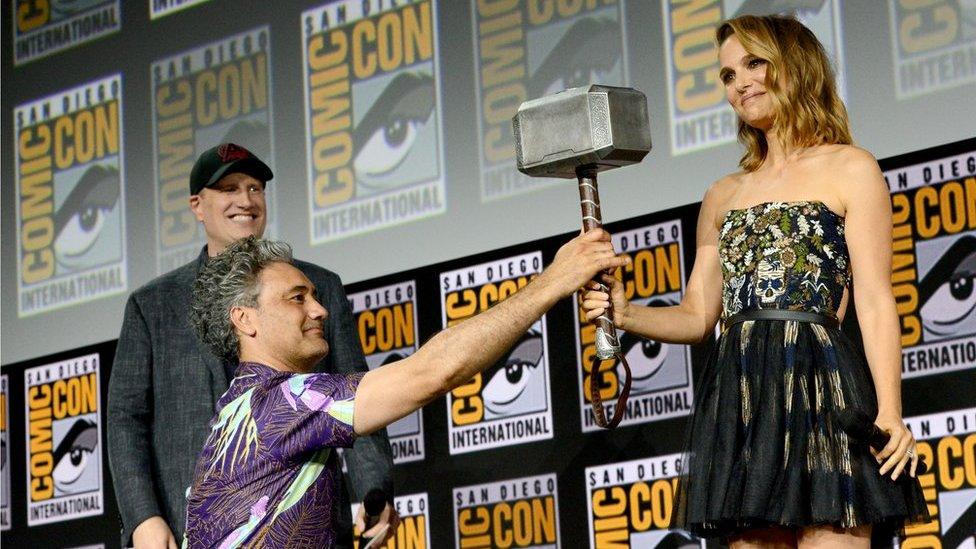
- Published18 July 2019
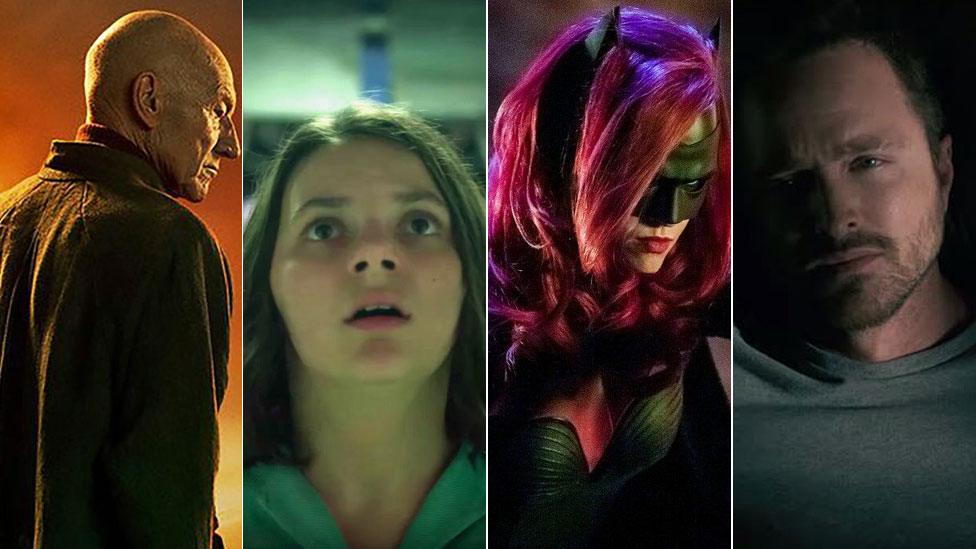
- Published10 May 2019
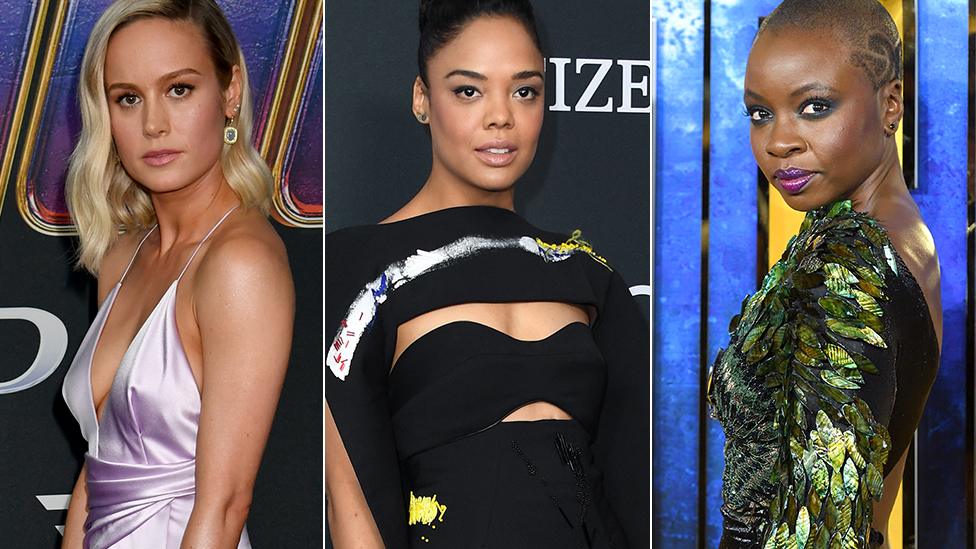
- Published10 October 2018
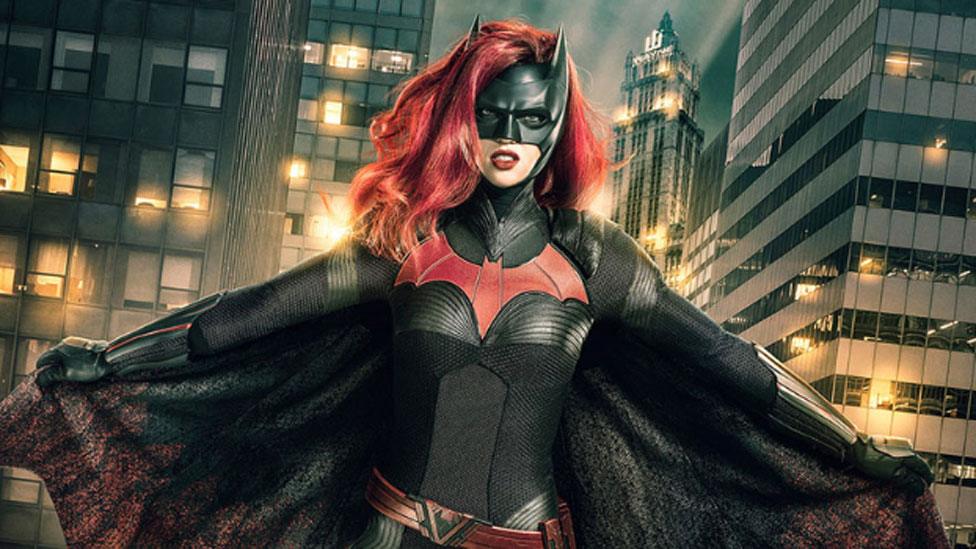
- Published11 May 2018
